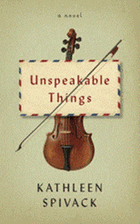
In her first novel, Unspeakable Things, poet Kathleen Spivack (With Robert Lowell and His Circle) focuses on Herbert Hofrat, a former Austrian government official who has escaped the Nazis with the members of his immediate family, save one son, settling them in a tiny apartment in New York City. Hofrat has been "chosen to live the hardest life of all: that of the survivor, the savior," spending wearying days alternating between a dim corner of the New York Public Library and an automat on 42nd Street.
Anna, Herbert's second cousin, is a physically deformed White Russian countess nicknamed "the Rat." Herbert helps engineer Anna's flight to the U.S., but even after she's reached this safe haven, she's haunted by the memory of an erotic encounter with the monk Rasputin that leaves mysterious burn marks on her thighs, explicitly described in Spivack's lush, if occasionally overcooked, prose. Meanwhile, a sinister German pediatrician named Felix lives in New York researching the "study and propagation of genius," and he turns the Tolstoi Quartet, emigrant musicians from Vienna, into involuntary participants in scientific investigations that conjure up the terrifying activities of real-life Nazi physicians. The novel climaxes in a highly charged encounter between Felix and Anna that knits these strands together.
Weariness and heartbreak are the dominant moods of this novel. While Spivack maintains a close focus on the hardships of the Hofrat family, she doesn't lose sight of the fact that this drama is playing out on a wider stage. Despite its strongly contrasting literary styles, Unspeakable Things feels like a tightly coiled spring, one that Kathleen Spivack manages to keep firmly under control. --Harvey Freedenberg, attorney and freelance reviewer

